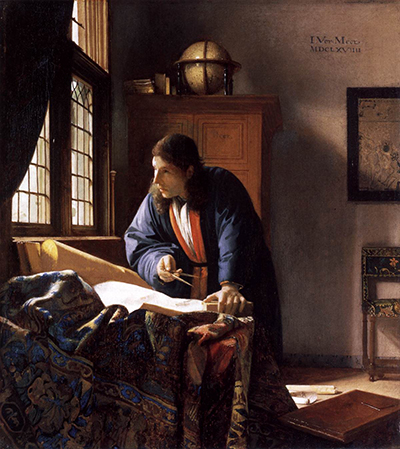The fall from and rise to the public conscience of Vermeer meant that much of his life was left undocumented including quotations from his life
The impact of his work, however, has ensured that in recent centuries many have studied and commented upon his legacy. There is simply no shortage of views from others, just his own.
Vermeer's own role within the Dutch Golden Age also ensured that his work is well connected within Dutch art history, alongside other famous artists like Rembrandt, Jacob van Ruisdael and Frans Hals. The legacy of Italian painter Caravaggio was also strongly linked to this period.
Quotations by Vermeer
There are currently no quotations directly from Vermeer available.
Quotations on Vermeer
In the work of Vermeer the subject of the picture becomes - for the first time in the history of art - the object that is contemplated.
Andre Malraux, 1951
There is so much mystery in each painting, in the women he depicts, so many stories suggested by not told.
Tracy Chevalier, 2014
Almost all his paintings are apparently set in two smallish rooms in his house in Delft; they show the same furniture and decorations in various arrangements and they often portray the same people, mostly women.
Hans Koningsberger, 1977
The Art of Vermeer must have been there on the morning of creation.
Frederick Sommer
Vermeer's woman reading a letter is as full of latent or subliminal kitsch as Tolstoy's War and Peace.
John Bayley
Yes, Johannes Vermeer paints in thin layers – there is no waste effort – and those small dots – no, they are not like Seurat’s, though they contain all the light the pointillist may have wished for, concentrated, hovering before the object, but not obliterating it.. ..Vermeer is not a sun painter, but rather a moon-painter – like Uccello – that’s good, it is the pure, final stage of art, the moment when it becomes more real than reality.
Arshile Gorky
Let us look at a Dutch interior and at an interior painted by an artist of the present day. The latter no longer touches us, because it does not possess the qualities of depth and volume, the science of distances. The artist who paints it does not know how to reproduce a cube. An interior by Van der Meer is a cubic painting. The atmosphere is in it and the exact volume of the objects ; the place of these objects has been respected, the modem painter places them, arranges them as models. The Dutchmen did not touch them, but set themselves to render the distances that separated them, that is, the depth. And then, if I go so far as to say that cubic truth, not appearance, is the mistress of things, if I add that the sight of the plains and woods and country views gives me the principle of the plans that I employ on my statues, that I feel cubic truth everywhere, and that plan and volume appear to me as laws of all life and ail beauty, will it be said that I am a symbolist, that I generalise, that I am a metaphysician ? It seems to me that I have remained a sculptor and a realist. Unity oppresses and haunts me.
Auguste Rodin
By art alone we are able to get outside ourselves, to know what another sees of this universe which for him is not ours, the landscapes of which would remain as unknown to us as those of the moon. Thanks to art, instead of seeing one world, our own, we see it multiplied and as many original artists as there are, so many worlds are at our disposal, differing more widely from each other than those which roll round the infinite and which, whether their name be Rembrandt or Vermeer, send us their unique rays many centuries after the hearth from which they emanate is extinguished. This labour of the artist to discover a means of apprehending beneath matter and experience, beneath words, something different from their appearance, is of an exactly contrary nature to the operation in which pride, passion, intelligence and habit are constantly engaged within us when we spend our lives without self-communion, accumulating as though to hide our true impressions, the terminology for practical ends which we falsely call life.
Marcel Proust




